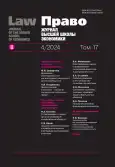Temporary Legislation as an Instrument of Accelerated Development of Society
- Авторлар: Tsomartova F.1
-
Мекемелер:
- Institute of Legislation and Comparative Law under the Government of the Russian Federation
- Шығарылым: Том 17, № 4 (2024)
- Беттер: 4-27
- Бөлім: Legal Thought: History and Modernity
- URL: https://journal-vniispk.ru/2072-8166/article/view/317723
- DOI: https://doi.org/10.17323/2072-8166.2024.4.4.27
- ID: 317723
Дәйексөз келтіру
Толық мәтін
Аннотация
Негізгі сөздер
Авторлар туралы
F. Tsomartova
Institute of Legislation and Comparative Law under the Government of the Russian Federation
Email: social3@izak.ru
ORCID iD: 0000-0001-9486-9900
Әдебиет тізімі
- Baturin Yu. M., Livshits R.Z. (1989) Socialist rule of law: from idea to implementation. Moscow: Nauka, 256 p. (in Russ.)
- Bauman Z. (2008) Liquid modernity. Saint Petersburg: Piter, 240 p. (in Russ.)
- Bergel J.-L. (2000) General theory of law. Moscow: NOTA BENE, 576 p. (in Russ.)
- Bogdanovskaya I. Yu. (2013) Delegated acts as secondary sources of law. Pravo. Zhurnal Vysshey shkoly ekonomiki=Law. Journal of the Higher School of Economics, no. 3, pp. 36–48 (in Russ.)
- Brenner R. (2014) The economics of global turbulence: advanced capitalist economies from long boom to long downturn, 1945–2005. Moscow: HSE Publishing House, 552 p. (in Russ.)
- Dogadailo E.Yu. (2013) Time and law. Doctor of Juridical Sciences Thesis. Moscow, 250 p. (in Russ.)
- Fagan F. (2013) Law and the limits of the government. Cheltenham: Elgar, 168 p.
- Giddens E. (2003) Structure of society: essays on structure theory. Moscow: Akademicheskiy project, 576 p. (in Russ.)
- Harvey D. (2021) The postmodernity. A research of cultural change roots. Moscow: HSE Publishing House, 576 p. (in Russ.)
- Kapitsa S.P. (2020) Paradoxes of growth. Moscow: Alpina, 192 p. (in Russ.)
- Khabrieva T.Ya. (2021) Legal base of managing Pandemic crisis: world and Russian experience. Zhurnal rossiyskogo prava=Journal of Russian Law, no. 2, pp. 5–17 (in Russ.)
- Khabrieva T.Ya. (2019) Cyclic normative arrays in law. Zhurnal rossiyskogo prava=Journal of Russian Law, no. 12, pp. 5–18 (in Russ.)
- Khabrieva T.Ya., Chernogor N.N. (2022) Law and the Pandemic: the lessons of the crisis. Vestnik Rossiyskoy akademii nauk=Bulletin of the Russian Academy of Sciences, vol. 92, no. 8, pp. 803–808 (in Russ.)
- Khabrieva T.Ya., Chernogor N.N. (2018) The law in the digital reality. Zhurnal rossiyskogo prava=Journal of Russian Law, no. 1, pp. 85–102 (in Russ.)
- Kouroutakis A. (2017) The constitutional value of sunset clauses: a historical and normative analysis. L.: Routledge, 212 p.
- Nikitinsky V.I., Samoshchenko I.S. et al. (1988) Legal experiment and improvement of legislation. Moscow: Juridicheskaya literatura, 304 p. (in Russ.)
- Nozdrachev A.F. (2022) Mandatory requirements as a new administrative Law institution: ideas, content, principles and Regulation levels. Administrativnoe pravo i process=Administrative Law and Process, no. 3, pp. 19-24; no. 5, pp. 8-15 (in Russ.)
- Nozdrachev A.F., Zyryanov S.M., Kalmykova A.V. et al. (2022) Regulatory policy of the Russian Federation: legal aspects of formation and implementation. Moscow: Infotropic Media, 288 p. (in Russ.)
- Petrov G.I. (1982) Time factor in Soviet law. Yurisprudenciya=Jurisprudence, no. 6, pp. 46–52 (in Russ.)
- Petrov G.I. (1983) Time in the Soviet social regulation. Yurisprudenciya= Jurisprudence, no. 6, pp. 47–52 (in Russ.)
- Rabinovich P.M. (1990) Time in legal regulation (philosophical and legal aspects).Yurisprudenciya=Jurisprudence, no. 3, pp. 19–27 (in Russ.)
- Rabinovich P.M. (1991) Timeliness in law. Questions of state and law theory, issue 9, pp. 55–62 (in Russ.)
- Ranchordas S. (2015) Sunset clauses and experimental regulations: blessing or curse for legal certainty? Statute Law Review, vol. 36, no. 1, pp. 28–45.
- Stepin V.S. (2018) Strategies of civilizational development and the issue of values. Moscow: S.l., 28 p. (in Russ.)
- Tenilova T.L. (2001) Time in law. Nizhnyi Novgorod: Pravovaya Akademia, 117 p. (in Russ.)
- Tikhomirov Yu.A. et al. (2022) Legal management in crisis situations. Moscow: Prospekt, 280 p. (in Russ.)
- Tikhomirov Yu.A. (2008) Cycles of legal development. Zhurnal rossiyskogo prava=Journal of Russian Law, no. 10, pp. 15–22 (in Russ.)
- Tille A.A. (1965) Time. Space. Law. The Soviet law in time and space. Moscow: Juridicheskaya literatura, 204 p. (in Russ.)
- Vernadsky V.I. (1997) About science. Vol. 1. Scholar knowledge. Scholar creativity. Scholar thought. Dubna: Feniks, 572 p. (in Russ.)
- Van Gestel R.A., van Dijck G. (2015) Better regulation through experimental legislation. European Public Law, vol. 17, no. 3, pp. 539–553.
- Vlasenko N.A. (2015) Individual approach as a trend of the Russian legislation development. Zhurnal Rossiyskogo prava=Journal of Russian Law, no. 12, pp. 11–17 (in Russ.)
- Zalessky V.V. (2006) Time factor in civil law relations. Zhurnal rossiyskogo prava=Journal of Russian Law, no. 9, pp. 114–121 (in Russ.)
Қосымша файлдар








